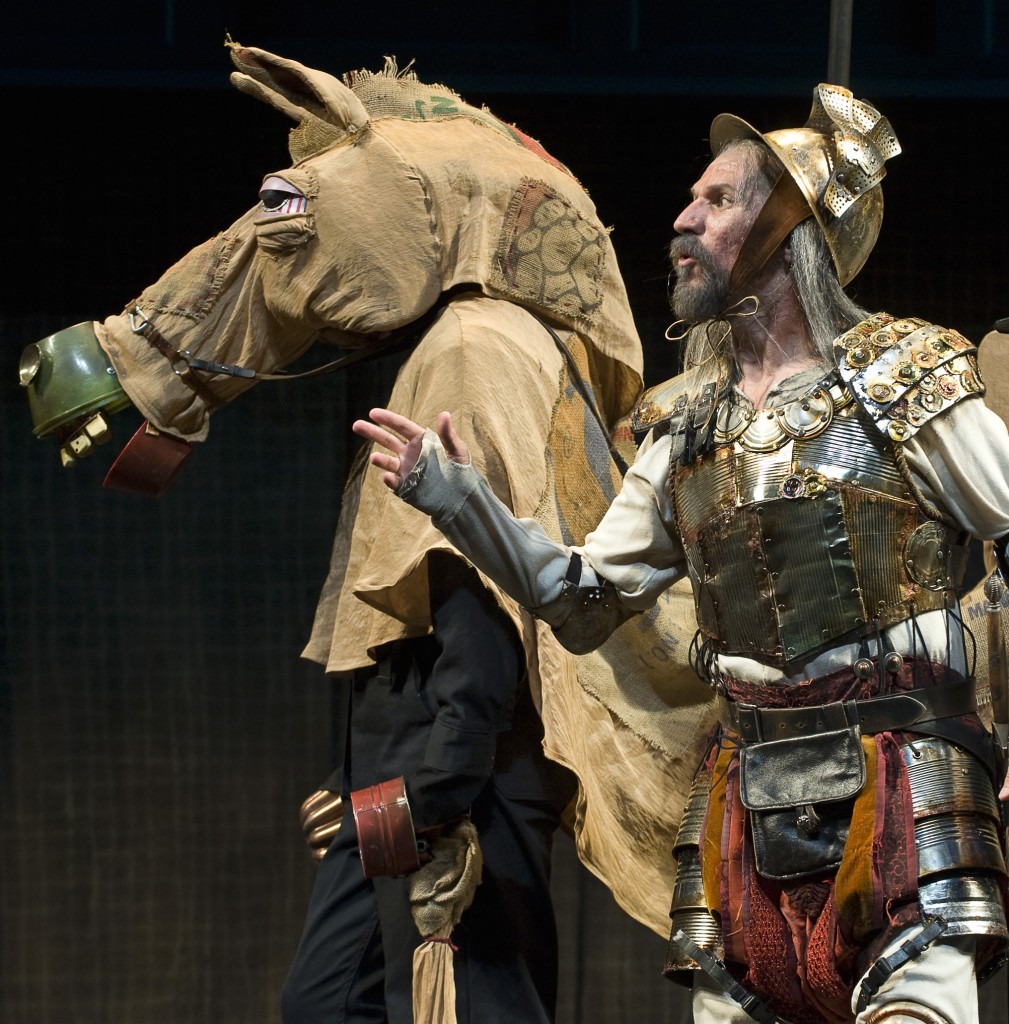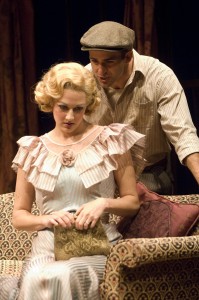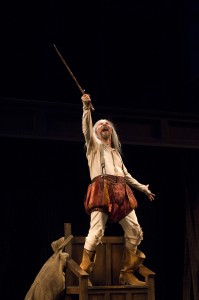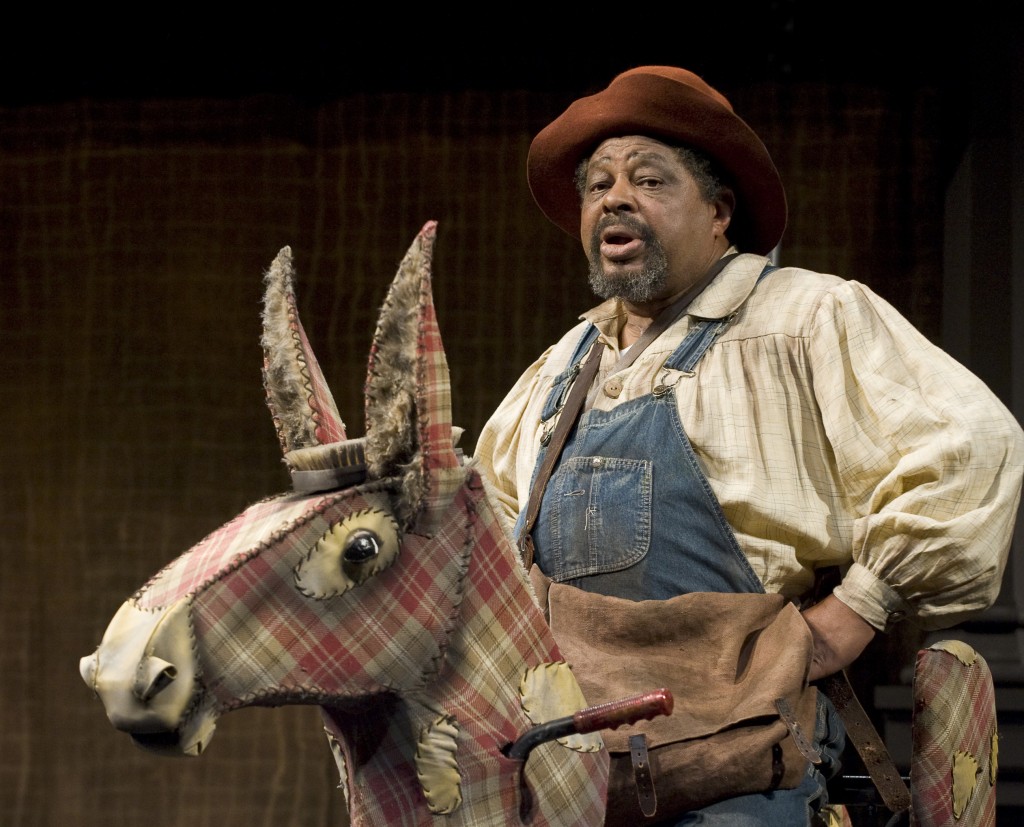
Armando Duran as Don Quixote with his noble steed Rocinante. Photo: David Cooper/Oregon Shakespeare Festival/2009
—————————————————
There aren’t many towns in America where you can spend the afternoon with Paradise Lost and then watch Don Quixote braying at the moon come night.
But this week I’m in Ashland, home of the Oregon Shakespeare Festival, and that was Tuesday’s bill of fare. No, it’s not just Shakespeare, or DeVere, or whoever wrote that great body of plays we call Shakespearean, on the festival stages.
In the case of Paradise Lost it isn’t John Milton, either. This is a latter-day variation on the theme of the Fall of Humankind — a 1935 play by the Golden Boy himself, Clifford Odets, who around this time was perhaps the most lionized young playwright in the United States, with almost concurrent productions of Waiting for Lefty and Awake and Sing! at The Group Theatre in New York. If it’s tough now to figure out exactly why Odets was such a god, well, the world and its styles have changed.
 The festival’s Don Quixote is a world-premiere adaptation by the playwright Octavio Solis, whose plays Gibraltar and El Paso Blue the company has produced in the past, and you could hardly come up with a pair of shows more different in texture: Outwardly, their personalities seem as different as the old knight-errant’s and his squire Sancho Panza’s. Paradise Lost is mostly sober-sided declamation and the anguished shredding of hair shirts. Don Quixote is mostly whimsy, pratfalls, stage tricks and elaborate horseplay (in the case of Quixote’s steed Rocinante, literally).
The festival’s Don Quixote is a world-premiere adaptation by the playwright Octavio Solis, whose plays Gibraltar and El Paso Blue the company has produced in the past, and you could hardly come up with a pair of shows more different in texture: Outwardly, their personalities seem as different as the old knight-errant’s and his squire Sancho Panza’s. Paradise Lost is mostly sober-sided declamation and the anguished shredding of hair shirts. Don Quixote is mostly whimsy, pratfalls, stage tricks and elaborate horseplay (in the case of Quixote’s steed Rocinante, literally).
But the two plays also have a curious connection, and it’s one of the things that makes a trip to Ashland so stimulating, even if you don’t much like a particular play or production. The two heroes — Don Quixote in Cervantes‘ tale, the inattentive businessman Leo Gordon in Paradise Lost — are dreamers and innocents, civilized men in uncivilized ages. And both, at least in their critics’ eyes, have been lured into foolishness by their odd attachment to reading and knowledge.
In a rude world the idealist is a failure and a fool — often a holy fool, as in the case of Dostoevsky’s Idiot and these two men. In both Don Quixote and Paradise Lost the central characters seem ineffectual at best and catastrophically detached at worst, but one suspects in both cases an even deeper authorial frustration with the modern cultures that have made these dreamers so out of touch with reality. How can Cervantes not regret a 17th century Spain in which the ideals of chivalry are nothing but a joke, or Odets the 20th century America of the Great Depression in which the cheaters and brutes prosper while the honest and earnest land on the streets? For Cervantes and Odets, humankind’s fall from grace is as much a corruption of a once nobler civilization as it is a stumbling of individual sinners on their spiritual paths. How can it be anything else when these two most graceful of men are outcasts and fools?

Old pros Mark Murphey, Michael J. Hume and Richard Elmore share a toast in “Paradise Lost.” Photo: Jenny Graham/Oregon Shakespeare Festival/2009
——————————
Yet in a way their critics are right. Leo and Don Quixote are fools, or at least incomplete men. Lacking the realism to temper and aim their idealism, they fail themselves and the people around them. It’s not far-fetched to think of Sancho Panza as Don Quixote’s missing half, the pragmatic realist who completes him, or would complete him if the old knight paid sufficient attention. In Paradise Lost it takes a triumvirate to make up the complete potential hero: streetwise Kewpie with his guts and drive; Leo’s Olympic-champion son Ben with his valor and dreams; Leo’s sickly second son, Julie, with his brains. In Odets’ world only the guts survive, and they survive only by turning ruthless.
As much as I like the underpinnings of Paradise Lost, I don’t much like Odets’ play. For a onetime god of the theater, Odets has taken a bit of a tumble from the heights himself. You don’t get a lot of chances to see one of his plays these days, and Ashland’s production, directed by artistic director emerita Libby Appel, gives you a sense of why. The play sprawls, it wears its heart on its sleeve, it’s preachy, its language can be ludicrously dated, and the whole thing screams allegory.
Plus, it gives easy answers to difficult questions. Paradise Lost seeks the roots and corrosive effects of the Great Depression, but the serpent in this 20th century garden isn’t Satan, it’s the warmongering plutocrats and evil manipulators of capitalism. And when you get down to it the play’s central character, Leo, is less an Adam (although he is curiously innocent) than a Job: Watch out for that plague of locusts entering stage right. In a nod to the great English poet of the 17th century who composed the original Paradise Lost, Odets names one of his characters Milton. But that may be the only wink in the whole three self-important acts.
Other people feel differently. Paradise Lost was revived in New York in 1983, and Herbert Mitgang greeted the production enthusiastically in the pages of the New York Times. And certainly Ashland’s production showcases some of Odets’ strengths: his passion, his quick-clipped dialogue, his unashamed sentimentality, his absolutism, which you can grudgingly admire even if it makes you wince. Some of the acting in Ashland’s production is very good, particularly by the old-pro trio of Michael J. Hume as Leo, Linda Alper as his wife Clara, and Richard Elmore as their friend Sam. But Odets’ one-dimensional writing defeats too many of the actors, who come across as nothing much but mouthpieces. Could stronger, more complex performances paper over the preaching and make you think you’re watching real characters instead of marionettes?
 Maybe. Or maybe what we see is what we get. Maybe Odets doesn’t get produced much anymore because other playwrights work his territory better. Anton Chekhov is the supreme observer and eulogist of characters oblivious to the new realities of an age that’s passed them by. Eugene O’Neill is deeper and more complex in his exploration of human torment, and so his sometimes awkward dialogue doesn’t grate the same way. Arthur Miller is as socially committed and much more authentically devoted to the idea of the tragic possibilities of the common man. He starts with his characters and works toward the idea; Odets sets out his theme and creates characters to illustrate their parts. Miller’s All My Sons, while not entirely on the same theme, is a much better play than Paradise Lost about a family’s self-destruction within a context of social responsibility.
Maybe. Or maybe what we see is what we get. Maybe Odets doesn’t get produced much anymore because other playwrights work his territory better. Anton Chekhov is the supreme observer and eulogist of characters oblivious to the new realities of an age that’s passed them by. Eugene O’Neill is deeper and more complex in his exploration of human torment, and so his sometimes awkward dialogue doesn’t grate the same way. Arthur Miller is as socially committed and much more authentically devoted to the idea of the tragic possibilities of the common man. He starts with his characters and works toward the idea; Odets sets out his theme and creates characters to illustrate their parts. Miller’s All My Sons, while not entirely on the same theme, is a much better play than Paradise Lost about a family’s self-destruction within a context of social responsibility.
Still, you don’t cross paths with Odets too often anymore. And it takes a company like the Shakespeare Festival to show you why.
It also takes a company like the Shakespeare Festival to tackle the staging of a literary work as vast and tenuously connected as Cervantes’ picaresque adventure, which is more discursive even than Melville’s rambling Moby-Dick. Solis has created a witty, sometimes bawdy, relatively quick-paced (for this story) and overarchingly comic version of the tale; I enjoyed it quite a bit.
It seems fitting that Don Quixote, with its restless wanderings beneath the sun and stars, is being produced on the festival’s open-air Elizabethan Stage, where the knight-errant’s grandiose imaginings have room to roam. The big stage also provides director Laird Williamson, costumer Deborah M. Dryden and puppet designer Lynn Jeffries plenty of room to goof around with the visual jokes and tricks that are so much of the show’s delight. They range from a puppet Dulcinea to a two-person prancing steed (anterior and posterior, and make your own jokes about that) to Pancho’s elaborate tricycle donkey and a wild, tumbling ride on a fearsome giant windmill.
The play doesn’t, and probably can’t, have as sharp a forward thrust as its hero’s lance. But Solis has provided a host of sharp quick characterizations, and the lead trio — Armando Duran as Don Quixote, Josiah Phillips as Sancho Panza, Jeffrey King as the wandering Cervantes stand-in — are immensely appealing. Quixote, of course, is the essential ingredient, and Duran plays him with a sweet and gentle abstraction even in the throes of absurdity, as when he’s whacking away at a hillside of sheep in the mistaken belief that they’re an invading army.
The one thing missing in this essentially comic version of the tale is Quixote’s nobility — the unyielding fierceness of his devotion to the ideal of chivalry. What makes Quixote a great and lasting character is not just the ridiculousness of his quest and his comic impracticality but also his transcendent moral steel. Don Quixote is truly better than the rest of us, and his inability to fit is our loss even more than his. This production doesn’t strive for that grandeur. Its spirit is Sancho Panza’s, not Don Quixote’s. But if that’s not the whole story, it’s a pretty good spirit to possess.
—————————–
Just one play on today’s agenda: Shakespeare’s comedy Much Ado About Nothing, one of my all-time favorite plays. Let’s see how it turns out.

Josiah Phillips as Sanch Panza, with his devoted donkey, in “Don Quixote.” Photo: David Cooper/Oregon Shakespeare Festival/2009
Top insert photo: Mark Bedard and Sarah Rutan in “Paradise L:ost.” Photo: Jenny Graham/Oregon Shakespeare Festival/2009
Bottom insert photo: Armando Duran as Don Quixote. Photo: Jenny Graham/Oregon Shakespeare Festival/2009